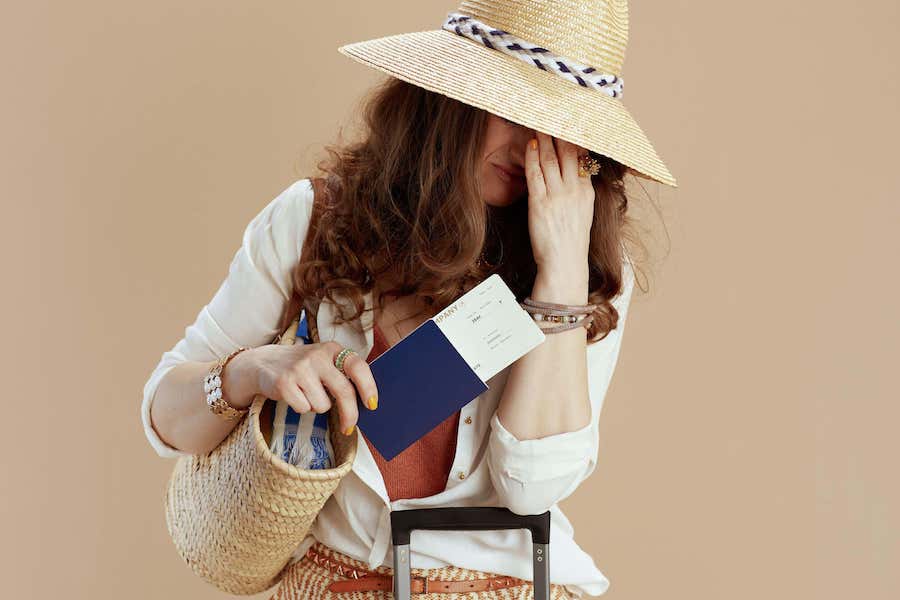Why do I get sick when I go on holiday?
A doctor explains the reasons behind the ‘let-down effect’ and steps you can take to manage stress in your daily life
So you’ve been counting down to your holiday – when you’ll finally have the chance to step off the hamster wheel and relax.
Except, no sooner have you checked in at your hotel than you find yourself reaching for the headache pills or tissues, as a niggling cold or migraine takes hold.
Sound familiar? If it feels like you suddenly get unwell when you finally hit the pause button, you’re not imagining it – there’s even a medical term for it.
The ‘let-down effect’
“This is known as the ‘let-down effect’,” says Dr Suhail Hussain, a personal physician and private home visiting GP. “When the body is used to functioning on high levels of [stress hormones] cortisol and adrenaline and they suddenly decrease, our immune system is exposed and then we’re prone to minor infections and excessive tiredness.

The ‘let-down effect’ can hit when we’re on holiday
“Pain and muscle aches also increase – adrenaline increases muscle tension, so imagine a rubber band always pulled tight, what happens when you let go?
“There may also be a spike in mental health problems, such as acute anxiety and panic attacks. Flare-ups in pre-existing chronic conditions is also a common phenomenon, for example migraine and asthma attacks,” he adds.
The ‘let-down effect’ can strike after a brief period of intense stress, such as after exams or completing a project, and after positive high-stress events, like planning a wedding. And for many people, it hits when you finally get to put down your to-do list and go on holiday.
What’s the deal with stress hormones?
Stress hormones serve an important purpose and we need them to function, so they’re not always bad news. “Basically, we are programmed to respond to danger – ‘fight or flight’ – so in stressful situations, there is an increase in levels of stress hormones adrenaline and cortisol,” Dr Hussain explains.
“Together, these two hormones control mood, motivation and fear. In periods of stress or heightened anxiety, adrenaline levels rise – causing an overdrive of the sympathetic nervous system, resulting in racing pulse, high blood pressure, sweating, etc.”
View this post on Instagram
Stress hormones also play a role in regulating inflammation, metabolising nutrients, and aiding immune function, sleep and energy. But ideally, they wouldn’t stay at raised levels for too long.
“If these hormones are always ‘on’, then inflammatory processes are accelerated and your immune system is impaired,” says Dr Hussain. “Consistently high levels of cortisol in your blood can lead to inflammation and a weakened immune system.”
Can you avoid the ‘let-down effect’?
Dr Hussain says: “You can try to lessen the impact of the ‘let-down effect’ by de-stressing slowly. Instead of crashing and burning, try to maintain a bit of activity on the holiday or some degree of exercise, such that there’s not a massive decrease in stress hormone levels, meaning you can allow the body to acclimatise slowly.”
But not getting sick on holiday may not be the only concern here. If your body is giving you warning signs that chronic stress is taking a toll, it’s important to listen.
“Constantly running on high levels of stress is very bad for you. It leads to the problems mentioned above but also longer-term consequences, such as plaque formation in arteries, leading to coronary events and strokes, depression and anxiety, and even addiction. Levels of obesity are also increased,” explains Dr Hussain.

Make de-stressing part of daily life
He says indications to look out for could include: “Recurrent illnesses, feeling tired, lack of energy. Poor response to glucose, leading to type 2 diabetes, elevated blood pressure and disruption of the sleep-wake cycle.”
If you have any concerns, check in with your GP. And Dr Hussain suggests finding ways to make managing stress in everyday life.
“Build in regular relaxation to your daily schedule. Get out to walk, spend time in the sun, observe nature. Listen to relaxing music. Make a regular sleep schedule, read, spend time with family and loved ones,” he says. “Don’t just work and work and work for the expectation of a big holiday at the end of it.”
The Press Association
Latest posts by The Press Association (see all)
- BBC to air two-part Call The Midwife Christmas special - December 23, 2024
- 6 mind sports to exercise your brain and keep you sharp - December 20, 2024
- Quiz: What classic Christmas food or drink are you? - December 20, 2024
- Leftover turkey and watercress pie - December 20, 2024
- Catherine and William choose family shot for Christmas card photograph - December 19, 2024




















